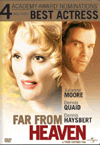| Johnny Charles is our newest film
reviewer. He brings us his views of Far
From Heaven, Starring Julianne Moore, Dennis Quaid and
continues with his second appearance as a book reviewer with Ronald L.
Donaghe's The Salvation Mongers...This is not such an odd pairing, as
both film and book tread the waters of self-loathing, as Johnny will
point out. |
 Far
From Heaven Far
From Heaven Starring Dennis Quaid, Julianne Moore, and Dennis Haysbert, Directed by Todd Haynes Far From Heaven is set in 1950s Connecticut, and tells the story of Frank and Cathy Whitaker (Quaid and Moore) and their two children. New Hartford, Connecticut is an upper class, highly stifled, intolerant town, typical of the 1950s, that places a high premium on outward appearances, economic status, and conformity. It’s a highly prejudiced town (although possibly no more so than any others) intolerant of blacks and gays, and anyone not fitting the idealized view how things ought to be. The movie tells two stories simultaneously, and neither can really be called a subplot to the other because they both fill center-stage, and are inextricably entwined. The movie opens with Frank Whitaker finding himself battling his feelings of homosexuality. He’s a man who has led a very conventional life, who has a high profile job, is well respected within the community, with a wife and two children. When he can no longer hide his feelings from his wife he seeks psychiatric help to find a “cure.” The passion with which he vows to “beat this thing,” and his growing frustration and anger as he fails, reflect his feelings of self-loathing, and his awareness of society’s (and his own) perception of homosexuality as a deviant behavior. One gets the feeling that this marriage was devoid of any real emotional connection from the outset, but as his counseling sessions continue, and Frank senses his ultimate failure to change himself, their relationship becomes overtly contentious and explosive, and begins to unravel. As the difficulties between the two grow, Cathy finds friendship and a growing affection for their gardener, Raymond, a well-educated, black man, beautifully played by Haysbert. These two parallel stories are depicted, Frank’s, seeking to first squelch his longings and desires, and Cathy’s, to experience her growing affection for Raymond. The horrors of the time are well portrayed, both the racial bigotry and the perception of homosexuality as something to be reviled and “dealt with,” and in a more subtle sense, an artificial and claustrophobic way of life. The director uses colors and lighting to subtly direct the audience. Reds and greens are noticeably predominant in the beginning, showing a superficial life of smoke and mirrors, stifled and carefully constructed, and Quaid is often placed in shadow, as his homosexuality is placed in shadow and concealment. The issues of seeking to fulfill and express, rather than eliminate and despise one’s desires and needs is the crux of the movie. It’s shown how the prejudices and value judgments of other’s sometimes color our own (in Frank’s case) and are sometimes overcome (in Cathy’s.) It starkly portrays the similarities between Cathy’s attraction to Raymond and Frank’s pull towards his natural inclinations; and interestingly, how neither can see things from the other’s perspective, although the similarities are glaring. The movie gives a look at the lengths to which one will go to change feelings that are both natural and normal, and the self-loathing that the perception of homosexuality as a sickness fosters. It shows what goes on behind the closed doors of what appears to be domestic perfection and harmony. The scenes where Frank finally learns to embrace rather than deny himself are extremely moving and beautifully done by Quaid. This is an excellent movie, with Quaid especially turning in a riveting, completely, believable performance. |
 The Salvation Mongers The Salvation Mongers by Ronald L. Donaghe This is a fictitious story told in the first person, something that Donaghe has already proven (in the Uncle Sean books) he can do very convincingly. It tells the story of Kelly O’ Kelley, who has lost his lover William, to suicide. William had voluntarily submitted himself to a Christian Fundamentalist program that promised to “cure” him of his homosexuality. It’s a chilling story of how Kelly follows William into the same program, to find out what really happened to his lover, and to see what drove him to feel that suicide was his only option. The backdrop for Lion’s Mouth Christian Ranch is an isolated canyon in the New Mexican desert, and as Donaghe has done in the past, he gives the reader a vivid sense of the New Mexican landscape, its sometimes-oppressive heat but also its open vistas, its canyons, its beauty and its wildness. Donaghe takes us deeper and deeper into the horror of Lion’s Mouth, into the minds of those people seeking a “cure,” and those seeking to affect such a cure. While the place, people and events are fictitious, they are all based on real places that did and do still exist. Through Kelly’s journal Donaghe explores the feelings of gay self-loathing, and how some people and groups, in this case a Christian Fundamentalist organization, capitalize on those feelings to further their own agendas, to either eradicate feelings of homosexuality, or if that fails (as it will) to eliminate the homosexual men themselves, in either the literal or spiritual sense. The book is a very quick read as one is pulled into the story, and Donaghe’s ability to assume the voice of a fictitious character in a totally convincing way enhance the story immensely. The Salvation Mongers is an emotionally riveting and horrifying story, very disturbing, and yet an uplifting testament to that thing within us all that seeks inner truth and joy. The passionate nature of the issues at the heart of The Salvation Mongers speak for themselves, needing neither enhancement nor embellishment, and yet are told in an understated way in Kelly’s “own words.” The combination of understated first person narrative, and highly charged subject matter combine to make this a very powerful book. The Salvation Mongers is a story that needs to be told, and as in all stories that do, you want the people who tell them best to be the ones to do it. Ron Donaghe is that person. This is a must read, for its content, its subject matter, and for its great readability and easy access into the issues at hand. |